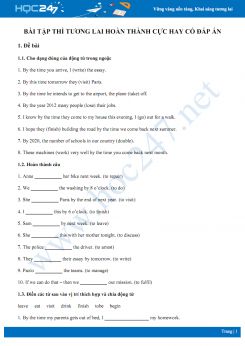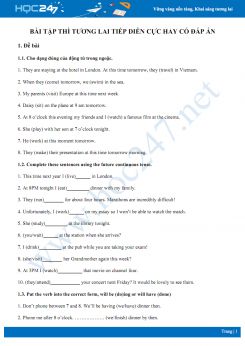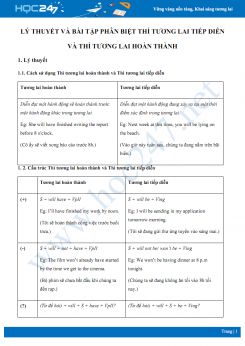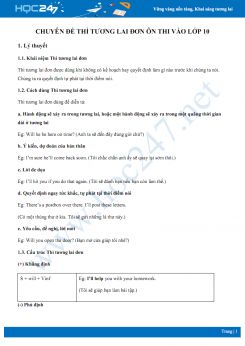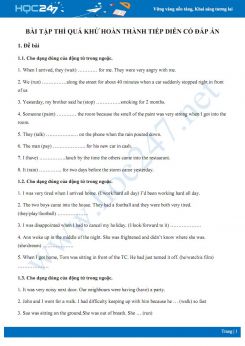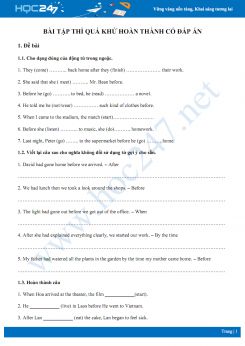Hoc247 xin giới thiệu đến các em tài liệu Cách sử dụng Must và Can't trong Tiếng Anh nhằm giúp các em luyện tập và chuẩn bị cho kì thi tuyển sinh vào lớp 10 sắp tới. Hi vọng đây sẽ là tài liệu tham khảo hữu ích trong quá trình học tập của các em. Mời các em cùng tham khảo nhé!
CÁCH SỬ DỤNG MUST VÀ CAN'T TRONG TIẾNG ANH
1. Lý thuyết
1.1. Cách sử dụng Must
Must (phải) có hình thức phủ định là Must not (Mustn’t), được dùng để:
a. Diễn đạt sự cần thiết, sự bắt buộc
Eg: You must get up ealier in the morning.
(Bạn nên thức dậy sớm hơn vào buổi sáng.)
b. Đưa ra lời khuyên hoặc yêu cầu được nhấn mạnh
Eg: You must be here before 8 a.m tomorrow.
(Bạn phải ở đây trước 8h sáng mai.)
c. Đưa ra một suy luận có tính chắc chắn cao
Eg: You must be tired after a long walk.
(Sau chuyến đi bộ dài chắc là bạn mệt rồi.)
d. Mustn’t dùng để chỉ sự cấm đoán
Eg: You mustn’t use the office phone for private calls.
(Bạn không được sử dụng điện thoại công ty vào việc riêng.)
1.2. Cách sử dụng Can’t
Can’t là hình thức phủ định của Can, được dùng để:
a. Nói về khả năng (không biết làm gì)
Eg: I can’t swim. (Tôi không biết bơi.)
b. Từ chối lời xin phép
Eg: You can’t sit there. Those seats are reserved.
(Bạn không thể ngồi ở đó. Những chỗ đó đã được đặt trước rồi.)
c. Chắc chắn một điều không thể xảy ra ở hiện tại
Eg: Harry can’t know how to ride a bike. He’s never been on one.
(Harry không thể nào biết đi xe đạp. Anh ấy chưa bao giờ ngồi trên xe đạp cả.)
1.3. Cấu trúc Must/ Can + have VpII
a. Must + have + VpII được dùng để diễn đạt điều gì đó hầu như chắc chắn đã xảy ra trong quá khứ
Eg: I’ve lost one of my gloves. I must have dropped it somewhere.
(Tôi bị mất một chiếc găng tay. Chắc hẳn là tôi đã đánh rơi đâu đó.)
b. Can’t + have + VpII được dùng để diễn đạt điều gì đó chắc chắn không thể xảy ra trong quá khứ
Eg: Daniel can’t have caught the bus. It doesn’t run on Sundays.
(Daniel chắc chắn đã không bắt được xe buýt. Nó không chạy vào Chủ Nhật.)
2. Bài tập
2.1. Hoàn thành những câu dưới đây theo các động từ: might, might not, must, mustn’t, can, can’t
0. Don’t stand up in the boat! You might fall in the river!
1. You really …………………. start spending more time on your work.
2. That’s a really stupid idea! You …………………. be serious, surely!
3. Don’t be silly. You …………………. expect me to believe you!
4. I learn to fly! You …………………. be joking!
5. Sue says she’s stuck in traffic and she …………………. be late.
2.2. Điền vào chỗ trống với các modal verb: must have been, can’thave been, have to/had to (be), didn’t have to (be)
0. John didn’t have to be at the bank until 10, so he arrived here five minutes ago.
1. He knows a lot about flying plane. He …………….. a pilot when he was young.
2. We had enough foreign currency left at the end of the holiday, so I …………….. buy any more.
3. There …………….. an accident on South Street because the road is closed off.
4. You …………….. waiting long. After all, I’m only five minutes late.
5. Vera …………….. at the supermarket this morning. I didn’t see her there.
2.3. Choose MUST or CAN’T
0. The baby has just had his bottle of milk. He must be hungry
1. You have lived here for so many years. You __________ know a lot of people!
2. He has been on duty all night. He ______________ be exhausted.
3. She always makes people repeat. She ______________ be a bit deaf.
4. I wonder who is at the door. It _____________ be Doris, she is still at work.
5. He knows a lot about biology. He ________________ be fond of the subject.
6. The people next door _______ be absent. Their shutters have been closed for two weeks.
7. It has been raining for weeks. The tourists ______________ enjoy their time!
2.4. Choose MUST or CAN’T
0. You've been travelling all day. You must be tired.
1. That restaurant .... be very good. It's always full of people.
2. That restaurant .... be very good. It's always empty.
3. I'm sure I gave you the key. You .... have it. Have you looked in your bag?
4. You're going on holiday next week. You .... be looking forward to it.
5. It rained every day during their holiday so they .... have had a very nice time.
6. Congratulations on passing your exam You .... be very pleased.
7. You got here very quickly. You .... have walked very fast.
8. Bill and Sue always travel business class so they .... be short of money.
2.5. Read the situations and use the words in bracket to write sentences with must have and can't have.
0. The phone rang, but I didn't hear it. (I/asleep) I must have been asleep.
1. The jacket you bought it very good quality. (it/very expensive)
2. I haven't seen the people next door for ages. (they/go away)
3. I can't find my umbrella. (I/leave/it in the restaurant last night)
4. Dave,who is usually very friendly, walked past me without speaking. (he/see/me)
5. There was a man standing outside the café. (he/wait/for somebody)
2.6. Make sentences using can or must
0. Ha / play games in the afternoon / do his homework in the evening.
Ha can play games in the afternoon, but he must do his homework in the evening.
1. Loan / play badminton on Sundays/ do the housework first
2. Ba watch television in the evening / go to bed early.
3. Lan / go out in the afternoon / do her homework in the evening.
4. They / go to school at 6.30 / have breakfast at six o’clock
5. He / go to work at 6 o’clock / get up at 5.30.
ĐÁP ÁN
2.1.
1. must
2. can
3. can’t
4. must
5. might
2.2.
1. must have been
2. didn’t have to
3. must have been
4. didn’t have to be
5. can’t have been
2.3.
1. must
2. must
3. must
4. can’t
5. must
6. must
7. can’t
2.4.
1. must
2. can't
3. must
4. must
5. can't
6. must
7. must
8. can't
2.5.
1. It must have been very expensive
2. They must have gone away
3. I must have left it in the restaurant last night
4. He can't have seen me
5. He must have been waiting for somebody
2.6.
1. Loan can play badminton on Sundays but she must do the housework first.
2. Ba can watch television in the evening, but he must go to bed early.
3. Lan can go out in the afternoon, so she must do her homework in the evening.
4. They can go to school at 6.30, so they must have breakfast at six o’clock.
5. He can go to work at 6 o’clock, so he must get up at 5.30.
---
Trên đây là toàn bộ nội dung của tài liệu Cách sử dụng Must và Can't trong Tiếng Anh. Để theo dõi nhiều tài liệu tham khảo hữu ích khác vui lòng đăng nhập vào hệ thống hoc247.net chọn chức năng xem online hoặc tải về máy!
Các em quan tâm có thể tham khảo tư liệu cùng chuyên mục:
- Bài tập thì tương lai tiếp diễn cực hay có đáp án
- Bài tập thì tương lai hoàn thành cực hay có đáp án
Chúc các em học tốt!



